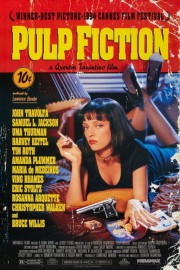Pulp Fiction
Admittedly, Quentin Tarantino’s “Pulp Fiction” is a film I probably don’t really have to rewatch to review- just pop in the soundtrack and relive the film in my mind.
Of course, just the idea of reviewing the film after 15 years is probably bat-shit crazy anyway. I mean, is there anything I can say that hasn’t been said a dozen or so times before? Probably not, but let’s look at the film this way…
…when it first came out, I didn’t want to see it. You read this right. The trailer didn’t really do anything for me. It was more a “WTF?” experience for me. Of course, I wasn’t the hard-core cineaste I am now, and I hadn’t yet seen Tarantino’s first film- 1992’s “Reservoir Dogs”- but still, given the phenomenon it was to become (and the fact that it wasn’t until December when my mother finally got me to see it), this is a pretty important revelation.
But back to the movie- ’cause you know, clearly how the film worked for me is clear. What’s in the case Vincent (John Travolta) and Jules (Samuel L. Jackson) get for Marcellus (Ving Rhames)? Who cares. What’s with the band aid on the back of Marcellus’ neck? I don’t know. (Couldn’t it just be a cut from shaving?) I’m more curious as to why when Mia (Uma Thurman) and Vincent pull up to Jack Rabbit Slims, Mia goes “Don’t Be a…” before air drawing a rectangle. Uh, Quentin, I know you love Uma and all (as you two had the epic “Kill Bill” saga on the way), but you should know that a square and a rectangle are not the same.
That said, I can’t fault Tarantino too much. His use of music in his movies means, for me, that all is forgiven. Even taking into consideration the storied musical genius of directors like Scorsese and Kubrick, Tarantino is on a plain all by himself. His soundtracks are masterpieces of classic tracks and less-known gems, whether it’s score tracks by Ennio Morricone to a track like “Surf Rider” or Urge Overkill’s reworking of “Girl, You’ll Be a Woman Soon,” QT knows how to use a song to add style and feeling to any type of sequence.
I mean, who could imagine the type of sadistic surprises in store for Butch (Bruce Willis) and Marcellus when their brawl after Butch double-crosses Marcellus in the ring when the song playing in that fateful pawn shop is Maria McKee’s “If Love is a Red Dress?” Who needs contemporary alterna-rock when Dick Dale & the Del-Tones’ surf rock “Miserlou,” followed immediately by Kool & the Gang’s “Jungle Boogie,” sets the tone for the type of retro thrills and craziness QT is about to unleash on the screen? True, Al Green’s “Let’s Stay Together” and Chuck Berry’s “You Never Can Tell” are some of the more iconic tracks he uses (beautifully) he uses in this shapeless mass of a movie, but it’s the lesser-known cuts that help shape Tarantino’s singular world view of honor among thieves.
Look, you guys probably know the story (stories) by now. Vince and Jules have some unforeseen complications retrieving a case for Marcellus. Butch has some personal attachment to a situation that goes from retrieving a watch to avoiding a gimp. A couple of small-time robbers discuss what’s changed in petty crime over the years, while Vincent and Mia have an erotically-charged night out that goes south and almost leads to death. Do I really need to go through them again? I’d rather recount some of my favorite moments from the film…
The best moments in a Tarantino film are the ones that don’t necessarily become iconic. It doesn’t take a rocket scientist to remember something like the “Royale With Cheese” conversation at the beginning; me, I’ll take Butch violently trashing his hotel room after his girlfriend forgets his father’s watch, only to say, “It’s not your fault” when he calms down enough to think straight. Sure, Jules’ recitation of Ezekiel 25:17 is the stuff of legends now, but more memorable to me is when Vincent- walking in on a hold up at the end- says to his partner, “Jules, you give that fucking nimrod $1500 and I’ll shoot him on general principle.” And then there’s the discussion between Jules and Vincent on car cleaning etiquette, which is pound-for-pound every bit as funny as Christopher Walken’s monologue to young Butch on how the aforementioned watch became his.
The greatest films of all-time defy easy characterization. Just look at my list: Hitchcock’s “Vertigo” flies in the face of suspense conventions as much as any Hitch film before or after it. Kubrick’s “2001: A Space Odyssey” rewrote the rules of sci-fi in a way no film after it has dared to do. Disney’s “Fantasia” films are the medium at its’ boldest yet purest. Tarkovsky’s “Andrei Rublev” uses its’ revisionism of history, and uncertainty for historical details of its’ main character, to do things modern day biopics not only wouldn’t dare to do, but would be lambasted for doing. While “Pulp Fiction” finds itself in the esteemed company of earlier crime classics like “Chinatown,” “GoodFellas,” “The Godfather,” and “The Big Sleep,” it also steps away from that tradition to do what those films did, and create a world all its’ own. Sure, some of the beats are familiar, but it’s the combinations Tarantino puts them in that makes it a music all its’ own.










